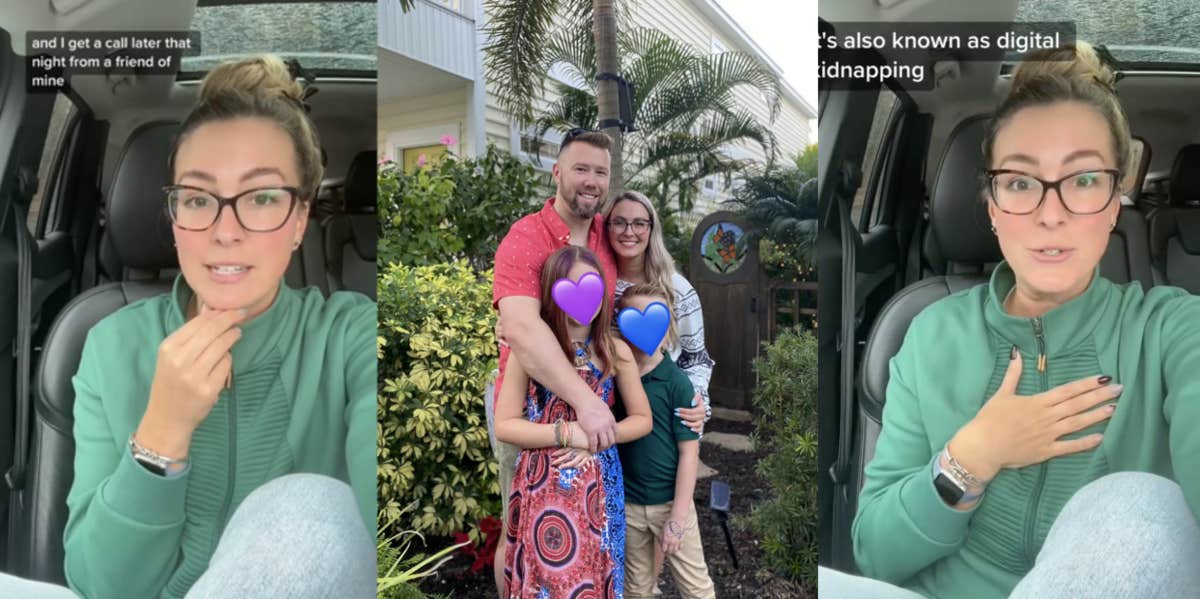Mom Says Her Kids Were 'Digitally Kidnapped' & Reveals Why She'll Never Show Their Faces Online Again
A family's images were stolen and impersonated on Instagram.
 TikTok
TikTok A mother discovered that her children were “digitally kidnapped” and is warning parents to avoid her mistakes.
Meredith Steele, 35, and her family went out to dinner in November 2022, and she shared a photo of the occasion on her Instagram.
Later that night, a friend who works at the restaurant told her that another Instagram account is operating under Steele’s likeness that also shared the photo—and even tagged the restaurant. The account had managed to amass thousands of followers through sharing photos of Steele and her children.
Meredith Steele says her kids were 'digitally kidnapped' by a stranger.
Steele took to her TikTok, which has over 966,000 followers today, to warn people of what she deems is digitally kidnapping. The faux account passed the photos off as an entirely different family.
“Someone had built a page with thousands of followers pretending to be me and my family with new identities and new names and new lives,” Steele said.
Despite being a TikTok influencer then, her Instagram account had approximately 5,000 followers, so she was never concerned with the possibility of her family’s identity getting hijacked.
In an interview with NewsNation, she said the experience was “super unsettling and scary.”
Steele took steps to remove her children’s digital footprint, like changing her name on Facebook and deleting posts with them in it. However, taking legal action is a challenging task with the laws currently in place.
The use of someone else's images without permission could fall under several legal claims such as copyright infringement, invasion of privacy through misappropriation of name or likeness; and violation of the right of publicity. But, in Steele's case, the person posing as her family didn't appear to be profiting off her images.
The Digital Media Law Project (DMLP) writes that: “Usually, people run into trouble in this area when they use someone’s name or photograph in a commercial setting.”
They cite the 2007 example of Alison Chang, where Virgin Mobile Australia used an image of her in an advertisement without properly attributing or requesting permission from the parents. Though, the court eventually dismissed the lawsuit.
However, other digital kidnapping cases similar to Steele's have proven that it is challenging to make a case without knowing the culprit.
In 2016, KOLD News 13 shared the story of an Alabama mother whose child was the victim of digital kidnapping.
Photos shared by Ashton Hamner of her daughter, Lennox, were taken from her Facebook account and turned into "memes." The perpetrators portrayed her healthy 16-month-old, as mentally challenged and a cancer patient.
"These people are posting anonymously, not using real names. Finding them to get the right person, that's the problem," David Smith, an attorney in South Carolina, said that even though the act is illegal, it's difficult to prosecute.
"Even if they are committing a true crime, you're kind of stuck."
Steele acknowledged that when she first gained popularity on TikTok, she lacked knowledge of the privacy issues posed by sharing images of her children. NewsNation, in their interview with Steele, said that experts recommend avoiding sharing your children altogether on social media platforms to ensure their privacy.
A report by the security company AVG found that more than 80% of children under the age of two have a social media presence. That significant percentage suggests the need for government legislation and privacy restrictions enabled in social media applications to protect minors’ digital footprint.
The Internet coined the term “sharenting” to label this phenomenon of parents uploading images of their children to the internet.
However, many like Steele care greatly about their children’s privacy and, instead, do not know how to approach this issue in today’s digital landscape.
Fortunately, Steele’s story has reached over 680,000 viewers on TikTok thus far. So, while social media companies and legislation continue not to resolve this mounting issue, parents will have to educate themselves in the meantime on the dangers that could stem from a simple post of their family outing to dinner.
Ethan Cotler is a writer living in Boston. He writes on entertainment and news.

